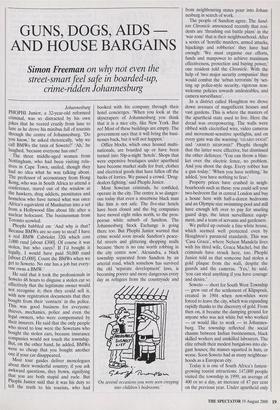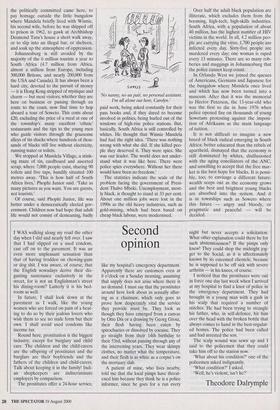GUNS, DOGS, AIDS AND HOUSE BARGAINS
Simon Freeman on why not even the
street-smart feel safe in boarded-up, crime-ridden Johannesburg
Johannesburg PHOPHI Junior, a 32-year-old reformed criminal, was so distracted by his own jokes that he veered crazily from lane to lane as he drove his minibus full of tourists through the centre of Johannesburg. 'Do you know,' he asked rhetorically, 'why we call BMWs the taxis of Soweto?' Ah,' he laughed, 'because everyone has one!'
The three middle-aged women from Nottingham, who had been visiting rela- tives in Cape Town, smiled, though they had no idea what he was talking about. The professor of accountancy from Hong Kong, who was in South Africa to attend a conference, stared out of the window at the hawkers, drug addicts, prostitutes and homeless who have turned what was once Africa's equivalent of Manhattan into a set from a Hollywood film about life after a nuclear holocaust. The businessman from Toronto scowled.
Phophi babbled on: 'And why is that? Because BMWs are so easy to steal! I have a red BMW Cabriolet 320i which cost 3,000 rand [about £300]. Of course it was stolen, but who cares? If I'd bought it legally, I would have paid 50,000 rand [about £5,000]. Count the BMWs when we get to Soweto. No one has a job but every- one owns a BMW.'
He said that it took the professionals in Soweto 48 hours to disguise a stolen car so effectively that the legitimate owner would not recognise it; then they could sell it, with new registration documents that they bought from their 'contacts' in the police. This was good business for everyone: thieves, mechanics, police and even the legal owners, who were compensated by their insurers. He said that the only people who stood to lose were the Sowetans who bought the stolen cars, because insurance companies would not touch the township. But, on the other hand, he added, BMWs were so cheap that you bought another one if your car disappeared. Most tour guides deliver monologues about their wonderful country; if you ask awkward questions, they frown, signifying that you are both stupid and rude. But Phophi Junior said that it was his duty to tell the truth to his tourists, who had booked with his company through their hotel concierges. 'When you look at the skyscrapers of Johannesburg you think that it is a nice' city, like New York. But no! Most of these buildings are empty. The government says that it will bring the busi- nesses back, but it will not happen.'
Office blocks, which once housed multi- nationals, are boarded up or have been turned into 50p-a-night 'hotels'. Shops that were expensive boutiques under apartheid have become market stalls for fruit, clothes and electrical goods that have fallen off the backs of lorries. We passed a crowd. 'Drug- dealers fighting,' said Phophi Junior.
Most Sowetan criminals, he confided, operate in the city. The centre is so danger- ous today that even a streetwise black man like him is not safe. The five-star hotels have been closed and the big companies have moved eight miles north, to the pros- perous white suburb of Sandton. The Johannesburg Stock Exchange is going there too. But Phophi Junior warned that crime would soon invade Sandton's peace- ful streets and glittering shopping malls because 'there is no one worth robbing in the city centre now'. Alexandra, a black township separated from Sandton by an arterial road, which somehow has survived the old 'separate development' laws, is becoming poorer and more dangerous every day as refugees from the countryside and `On several occasions you were seen creeping into children's bedrooms.' from neighbouring states pour into Johan- nesburg in search of work.
The people of Sandton agree. The Sand- ton Chronicle announced recently that resi- dents are 'thrashing out battle plans' in the `war zone' that is their neighbourhood. After a series of 'horrific murders, armed attacks, hijackings and robberies' they have had enough: 'We must organise our efforts, funds and manpower to achieve maximum effectiveness, protection and buying power,' one resident told the Chronicle. With the help of 'two major security companies' they would combat the 'urban terrorists' by 'set- ting up police-style security, vigorous non- welcome policies towards undesirables, and camera surveillance'.
In a district called Houghton we drove down avenues of magnificent houses and vast gardens. This is where the masters of the apartheid state used to live. Here the dread was overpowering. The walls were ribbed with electrified wire, video cameras and movement-sensitive spotlights, and on every gate was the warning: 'GUARD DOGS!' and 'ARMED RESPONSE!' Phophi thought that the latter were effective, but dismissed the other defences: 'You can throw a blan- ket over the electric fence, no problem. And you shoot the dogs. Every robber has a gun today.' When you have nothing,' he added, 'you have nothing to fear.'
Property prices have crashed in neigh- bourhoods such as these: you could sell your two-bedroom flat in central London and buy a house here with half-a-dozen bedrooms and an Olympic-size swimming-pool and still have enough left over to pay for snarling guard dogs, the latest surveillance equip- ment, and a team of servants and gardeners.
We pulled up outside a fine white house, which seemed well protected even by Houghton's paranoid standards. This was `Casa Graca', where Nelson Mandela lives with his third wife, Graca Machel, but the criminals have struck here, too. Phophi Junior told us that someone had stolen a gold plaque from the wall, despite the guards and the cameras. 'Yes,' he said, `you can steal anything if you have courage and desire.'
Soweto — short for South West Township — grew out of the settlement of Klipspruit, created in 1904 when non-whites were forced to leave the city, which was expanding rapidly thanks to the discovery of gold. From then on, it became the dumping ground for anyone who was not white but who worked — or would like to work — in Johannes- burg. The township reflected the social chasms between Indian businessmen, black skilled workers and unskilled labourers. The elite rebuilt their modest bungalows into ele- gant houses; the masses squatted in huts, or worse. Soon Soweto had as many neighbour- hoods as a European city.
Today it is one of South Africa's fastest- growing tourist attractions: 147,000 people visited the township in 1999, an average of 400 or so a day, an increase of 47 per cent on the previous year. Under apartheid only the politically committed came here, to pay homage outside the little bungalow where Mandela briefly lived with Winnie, his second wife, before he was shipped off to prison in 1962, to gawk at Archbishop Desmond Tutu's house a short walk away, or to slip into an illegal bar, or shebeen, and soak up the atmosphere of oppression.
Johannesburg is still avoided by the majority of the 6 million tourists a year to South Africa (4.7 million from Africa, almost a million from Europe, including 300,000 Britons, and nearly 200,000 from the USA and Canada). It has always been a hard city, devoted to the pursuit of money — it is Hong Kong stripped of mystique and charm — but most visitors, whether they are here on business or passing through en route to the coast, now find time to hop aboard a tour of Soweto. This costs about £20, excluding the price of a meal at one of the township's many excellent 'ethnic' restaurants and the tips to the young men who guide visitors through the gruesome alleys of tin shacks where hundreds of thou- sands of blacks still live without electricity, running water or toilets.
We stopped at Mandela Village, a stink- ing maze of tin, cardboard and assorted scrap, where 7,000 people exist, sharing 90 toilets and five taps, handily situated 100 metres away. 'This is how half of South Africa lives,' Phophi Junior said. 'Take as many pictures as you want. You are guests, not tourists.'
Of course, said Phophi Junior, life was better under a democratically elected gov- ernment. Children now had hope that adult life would not consist of demeaning, badly No nanny, no au pair, no personal assistant. I'm all alone out here, Carolyn.'
paid work, being asked constantly for their pass books and, if they dared to become involved in politics, being hurled out of the windows of high-rise police stations. But, basically, South Africa is still controlled by whites. He thought that Winnie Mandela had had the right idea. 'There was nothing wrong with what she did. If she killed peo- ple they deserved it. They were spies. She was our leader. The world does not under- stand what it was like here. There were police spies everywhere. Without her there would have been no freedom.'
The statistics indicate the scale of the problem facing the government of Presi- dent Thabo Mbeki. Unemployment, most- ly black, is thought to stand at 33 per cent. About one million jobs were lost in the 1990s as the old heavy industries, such as gold-mining, which had been based on cheap black labour, were modernised. Over half the adult black population are illiterate, which excludes them from the booming, high-tech, high-skills industries. South Africa, with a population of about 40 million, has the highest number of HIV victims in the world. In all, 4.2 million peo- ple are carrying the virus; 1,700 people are infected every day. Sixty-five people arc murdered every day; one woman is raped every 13 minutes. There are so many rob- beries and muggings in Johannesburg that the police cannot keep count.
In Orlando West we joined the queues of Americans, Germans and Japanese for the bungalow where Mandela once lived and which has now been turned into a museum. After that it was the memorial to Hector Peterson, the 13-year-old who was the first to die in June 1976 when police opened fire on thousands of young Sowetans protesting against the imposi- tion of Afrikaans as the main language of tuition.
It is not difficult to imagine a new breed of black radical emerging in South Africa: better educated than the rebels of apartheid, dismayed that the economy is still dominated by whites, disillusioned with the aging conciliators of the ANC, and unwilling to accept that the free mar- ket is the best hope for blacks. It is possi- ble, too, to envisage a different future: wealth seeps out as the economy grows and the best and brightest young blacks are absorbed into the system. And it is in townships such as Soweto where this future — angry and bloody, or pragmatic and peaceful — will be decided.



























































 Previous page
Previous page